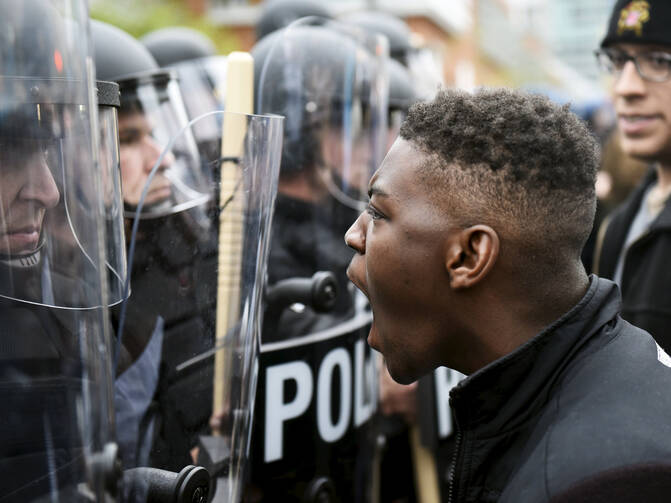Step away from criminal-justice reform. That’s the message of a Politico column by Rich Lowry with the sarcastic and provocative headline “#SomeBlackLivesDontMatter.” The title is supposed to be an ironic twist on the slogan “Black Lives Matter,” and a rebuke to those who protest police misconduct when there are still black victims of crime. They “don’t care about black lives per se so much as scoring points against the police,” Lowry writes. They prove that “Some black lives really don’t matter. If you are a young black man shot in the head by another young black man, almost certainly no one will know your name.”
Lowry’s deeply authoritarian message, despite its shaming of anyone who marched in outrage over the death of Freddie Gray, is not really meant for the citizens of Baltimore or any other city with tensions over military-style policing. Lowry is not so obtuse he doesn’t understand that protest marches have relatively attainable goals—such as preventing another death like that of Gray, who was beaten and suffered fatal injuries because he made “eye contact” with a police officer before running in the opposite direction. He’s not truly perplexed that Baltimore residents aren’t instead marching against… what, man’s capacity for evil?
The real message of the Politico column is to warn politicians away from efforts to de-militarize police departments and find alternatives to the mass-incarceration policies of the past few decades. Any spikes in crime will be used against them.
Lowry notes that there have been 35 murders so far this May in Baltimore, the highest monthly total since 1999. “The implication is clear,” he writes. “More people need to be arrested in Baltimore, not fewer. And more need to be jailed. If black lives truly matter, Baltimore needs more and better policing and incarceration to impose order on communities where a lawless few spread mayhem and death.”
The implication is indeed clear: no questioning of police conduct as long as crime exists. New Jersey Gov. Chris Christie used the same logic in dismissing concerns about the surveillance of Americans’ phone calls under the anti-terrorism Patriot Act. “You can’t enjoy your civil liberties if you’re in a coffin,” he told an audience in New Hampshire (whose state motto is “Live Free or Die”).
There may be, as Lowry suggests, a need to arrest more people for violent crimes in Baltimore, but that doesn’t mean police misconduct in that city should be a verboten topic. This week the Atlantic’s Alana Semuels reported on police reform in Cincinnati, where aggressive tactics (including “zero tolerance sweeps” with mass arrests for petty crimes) led to riots in 2001. Since then, the city has developed reform measures that involve fewer arrests and better cooperation between police and neighborhood leaders.
Putting fewer people in jail in Cincinnati has not made the city more dangerous, writes Semuels: “Between 1999 and 2014, Cincinnati saw a 69 percent reduction in police use-of-force incidents, a 42 percent reduction in citizen complaints and a 56 percent reduction in citizen injuries during encounters with police.” At the same time, “violent crimes dropped from a high of 4,137 in the year after the riots, to 2,352 last year.”
There is simply no evidence that if we exempt the police from public criticism, or give police departments the leeway to arrest more and more citizens, they will eventually bring crime under control.
But the most offensive aspect of Lowry’s sarcastic #SomeBlackLivesDontMatter hashtag is the implication that black Americans have no right to protest police conduct as long as other black Americans commit crimes. It’s as if the residents of Baltimore and other cities with high-poverty neighborhoods are being told they must earn their First Amendment rights by controlling the behavior of everyone else with the same skin color. It’s the American way for suburbanites to protest against high taxes or Obamacare, but black residents of major cities are not supposed to raise a peep about abuses such as the arrests of men in Washington, D.C. for standing outside their own homes.
#SomeBlackLivesDontMatter is really a way to dismiss concerns about police misconduct and to justify limits on public protests. Most of all, it’s a declaration of hardball politics. “Tough on crime” has been an effective slogan for thousands of American politicians, and it’s going to be used by thousands more.








